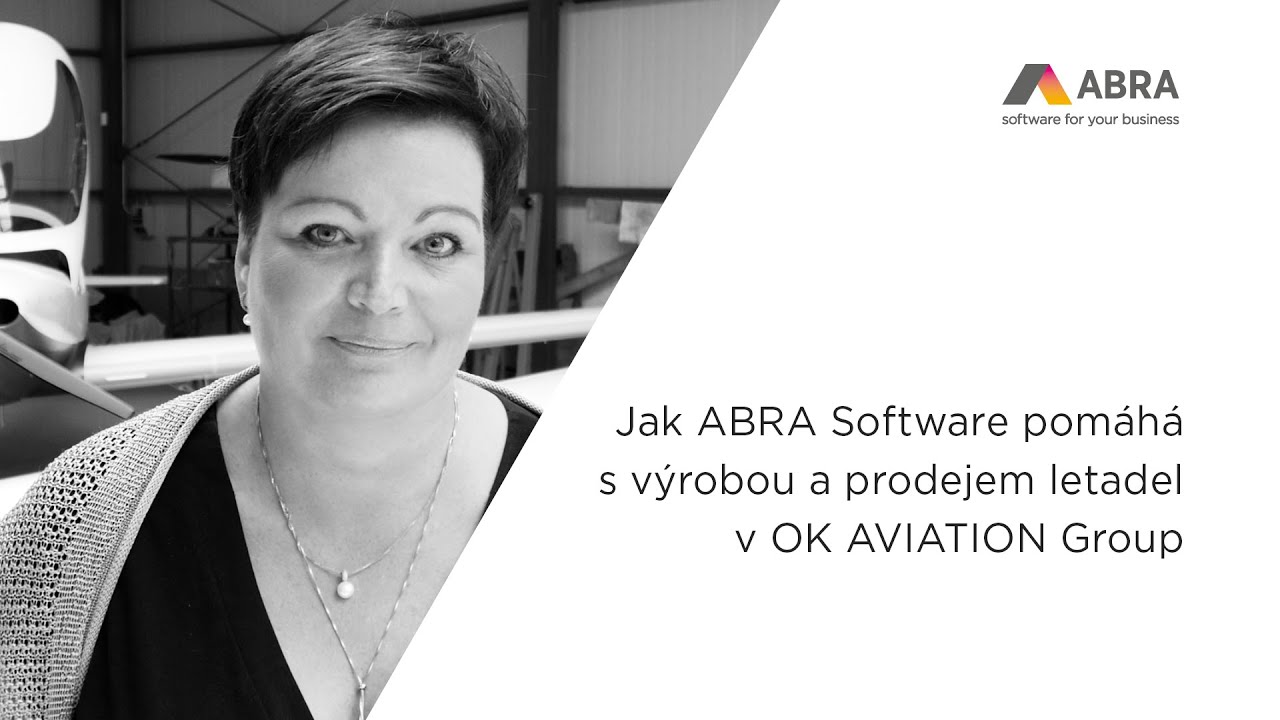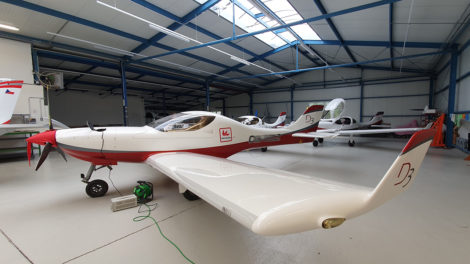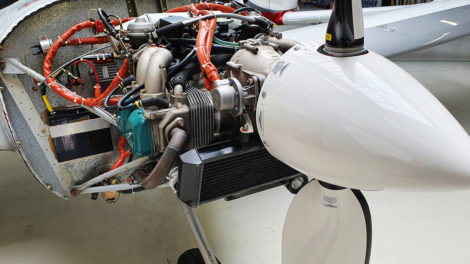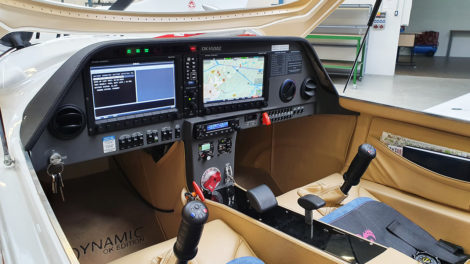Managing an Airline is a Challenge. The CEO of OK AVIATION Group Faced it Head-on
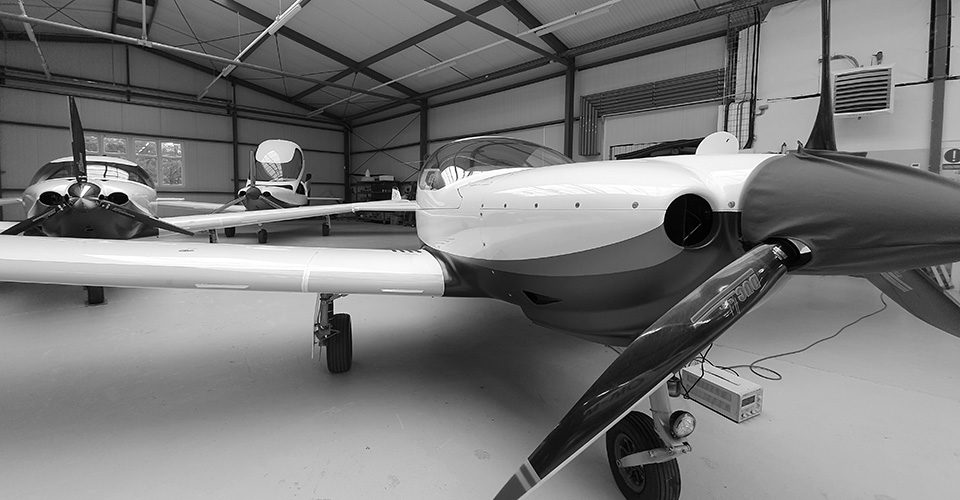
The first wave of the coronavirus crisis hit the aviation industry really hard. Grounded aircraft, out-of-work pilots, closed borders and issues with transporting goods and spare parts. So how did the Czech OK AVIATION Group, which offers comprehensive private flight services, cope when a substantial part of the business suddenly vanished? At the company's headquarters at Příbram Airport, we asked the CEO, Kateřina Svatošová.
"Coronavirus started to affect us even before it erupted in full force in March. By the end of January and in February, our customers were already cancelling flights en masse. Government restrictions followed and all air traffic was grounded," Ms. Svatošová sums up the unfolding crisis.
What Were the Most urgent Steps the Management Had to Take?
- Quick reaction to the changes – "when it comes to trainig, we focused on online training, we modified our training materials, and produced special training videos."
- Strategy was reviewed – "We had to reconsider how we function with regard to air traffic, and we are now working on new long-terms plans."
- Intensified e-commerce development – "We are partnering with ABRA Software to work on automating online sales and interconnecting them with our information system. We need to automate the ordering process and the subsequent invoicing, and to synchronize information about stock. Our external eshop was not satisfactory, so we decided to close it and migrate the entirety of our online sales into the ABRA e-shop solution."
- Using modern IT – "Last year, we invested into modernizing our IT, so letting our employees work from home was not a problem."
- Focus on services – " In spite of the closed borders, we still managed to secure orders for aircraft maintenance and repairs."
What Does the OK AVIATION Group Do?
The five subsidiaries of the OK AVIATION Group are engaged in different activities – airport services, aircraft sales, fractional ownership, handlign services, pilot training, and the manufacture of UL aircraft. Which area is key for your company?
Aircraft sales have always been key for us, especially the fact that we exclusively repreent the brands PILATUS and PIPER in Central and Southeastern Europe. Our subsidiaries were established gradually as sales support, to enable us to offer our customers a wider range of better quality support and services. However, we throw our full weight behind the development of the individual companies, which is reflected in their constant growth. I am very happy with their numbers. We suceeded in creating a symbiosis in which companies support each other and, working together, provide comprehensive services to aircraft owners.
Which aircraft are manufactured by you? And how does it work?
We produce one type of UL aircraft, for which we have all the relevant manufacturing documentation. If we have all the components and there are no unexpected delays, we are able to build the aircraft in two months, including all mandatory tests and inspections. Our primary concern is safety. The entire manufacturing process is accompanied by checks, so our technicians have detailed knowledge of each aircraft and are able to use this familiarity when servicing the plane later.
Which Management Techniques Proved to Be Useful for the CEO of OK AVIATION Group?
Kateřina Svatošová and I also talked about managing and motivating your people and how to find the energy for both work and family. Here are ten interesting tips:
- Don't be afraid of change and innovation. Our transformation from a small family business to a large group of companies also required straightening our processes. The sooner you do it, the better.
- We communicate all changes so that our people can understand them, want to participate in them, and come up with new ideas themselves.
- I listen to people and make time for them when they need it. We discuss each task and I make sure that people understand it.
- I try to get to know my colleagues and understand their limits and strengths. Then I can ensure that everyone is given work that's satisfying to them. And that they will do well.
- Motivation is important. In our case, it is easy because our people are moticated by their passion for flying.
- We support personal development and aim for creating a family atmosphere. We need everyone to be able to help each other and deal with complex problems, because our work is primarily about safety.
- I learned to organize my time, plan my work day and consistently stick to the plan. On the other hand, it is also important to be able to say stop, I am done for today and I am going to spend time with my family.
- To recharge, I like to do work I don't have to think about but at the same time, I can see the results of, like chopping wood. I love books and the beauty of the Czech language. Reading is the best way to relax. My greatest source of energy is my three children. They are absolutely amazing and, together with my husband, give me incredible support.
- I love challenges. I like it when I have to deal with complex issues. And when the result is a success, the satisfaction is what keeps me going.
- I welcome everything that makes the company easier to run.
How Does ABRA Gen Make Running OK AVIATION Easier? Linking the Information within the System is Key
Can you imagine running a company without an information system? And what do you appreciate most about your system?
Basically, I can't. If I want to schedule expenses and cash flow, I need to know what orders are open or being processed, what payments we have to make and when, and when we can expect payment from the customer. All this is very important and I have it available in ABRA Gen.
Oftentimes, you can glean surprising facts from such well structured information. Subjective opinion can be very distorted.
Vladimír Finsterle, the owner of Lékárna.cz, mentions a similar idea in his interview: he says he bases his decisions on hard business data.
I second that. There have been many times when I thought, at first glance, that a product is doing major business, but data showed that a group of other smaller products is far more interesting to customers. In short, facts are indispensable in decision-making.
Where do you see the greatest room for improvement when it comes to automating business processes?
We started with automation across the company (a group VAT payer). Thanks to the fact that the individual companies' activities are interlinked, the invoicing and administrative burden within the group is relatively heavy. One company would spent quite a lot of time issuing an invoice with all the requisites, which would then be sent to another company, where someone would again spend a disproportionate amount of time entering the data manually; I found that horrible. Our first step in the automation process was to move the invoicing between the companies into the ABRA Gen system. As it turns out, the time savings are substantial.
In your opinion, what are the benefits of the electronic ISDOC format of invoices?
We use the ISDOC format in electronic communication within the group. We would also like to offer this format in out outwards communications. I think electronic documents are crucial; thanks to them, employee efficiency is suddenly on a completely different level.
How does ABRA Gen help you with the manufacturing and servicing of custom aircraft?
We use ABRA Gen to manage the manufacturing and servicing of ultralight aircraft. We have adapted the system to our needs and we rely on it. What's great is that this enables us to create various code lists and record exact production processes, which are easy to link with the administrative part. Once we register the exact aircraft production process in ABRA Gen, including a detailed record of all necessary parts and materials, we have instant overview of whether we have all components for a new order in stock. We use minimum and maximum stock levels. And thanks to the precise positioning in the warehouse, the warehouse manager always knows exactly where to look, down to the smallest screw.
Based on all this information, we prepare service kits so that technicians don't have to make multiple warehouse runs. The technicians know the type of serviced aircraft in advance, and if it's a regular inspection, they know exactly which taks are needed. The warehouse can prepare a kit containing everything the technicians need to do their job. ABRA Gen determines the contents of the kit because it knows what each task entails and, if a part is unavailable, it makes sure it is ordered right away.
We also find it very helpful that we can attach anything we need to all documents. Every part requires full documentation and historical records. This way, everything is stored in one place and linked to a specific receipt card. So, if there is a complaint, we can see all the relevant information immediately.
Is there any other part of ABRA Gen that makes your business processes easier?
In my opinion, the most important advantage is the fact that everything is linked. When I open an invoice we just received, I am able to quickly look through business cases, see the relevant documents, and make sure all documentation is complete and we hadn't forgotten anything. This way, I can better monitor and influence cash flow. I appreciate that I can see all of the information on my monitor and I don't have to task several people to get it. This saves me, and the people around me, a lot of time.
We also use ABRA Gen for quality assurance, where this interlined information is very important. The data tells you the story even if you weren't personally present at every step, which I think is a very good thing.
